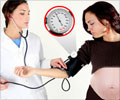According to a University of Pittsburgh Schools of the Health Sciences study , Vitamin D deficiency in early pregnancy has been shown to be associated with a five-fold increase in the risk of pre-eclampsia.
A complication of pregnancy marked by soaring blood pressure, pre-eclampsia is a leading cause of maternal and foetal illness and death. Pre-eclampsia affects up to 7 percent of first pregnancies, and health-care costs associated with pre-eclampsia are estimated at $7 billion a year in the United States alone.“Our results showed that maternal vitamin D deficiency early in pregnancy is a strong, independent risk factor for preeclampsia,” said Lisa M. Bodnar, Ph.D., M.P.H., R.D., assistant professor of epidemiology at the University of Pittsburgh Graduate School of Public Health (GSPH) and lead author of the study. “Women who developed preeclampsia had vitamin D concentrations that were significantly lower early in pregnancy compared to women whose pregnancies were normal. And even though vitamin D deficiency was common in both groups, the deficiency was more prevalent among those who went on to develop preeclampsia.”
For this investigation, Dr. Bodnar and her colleagues evaluated data and banked blood samples taken from women and newborns between 1997 and 2001 at Magee-Womens Hospital of the University of Pittsburgh Medical Center (UPMC) and affiliated private obstetrician practices. Data were analyzed for 1,198 women enrolled in the Pregnancy Exposures and Preeclampsia Prevention Study, a prospective survey designed to examine factors that may predispose women to preeclampsia. Out of this group, 55 cases of preeclampsia and 220 controls were selected for further study.
Samples of maternal blood were taken prior to 22 weeks pregnancy and again just before delivery. Samples of newborn umbilical cord blood also were tested for 25 hydroxyvitamin D, an indicator of vitamin D status.
“Low vitamin D early in pregnancy was associated with a five-fold increase in the odds of preeclampsia,” said Dr. Bodnar, who also is an assistant investigator at the university-affiliated Magee-Womens Research Institute (MWRI). “Data showed this increase risk persisted even after adjusting for other known risk factors such as race, ethnicity and pre-pregnancy body weight. Also troubling was the fact that many of the women reported taking prenatal vitamins, which typically contain 200 to 400 International Units of vitamin D,” she said.
“Even a small decline in vitamin D concentration more than doubled the risk of preeclampsia,” noted James M. Roberts, M.D., senior author of the study and MWRI founding director. “And since newborn’s vitamin D stores are completely reliant on vitamin D from the mother, low vitamin levels also were observed in the umbilical cord blood of newborns from mothers with preeclampsia.”
Advertisement
In the developing world, preeclampsia accounts for up to 80 percent of maternal deaths. And while treatment is more available in developed countries, preeclampsia remains the leading cause of maternal death. Infants born to mothers with preeclampsia have a risk of mortality five times greater than those born to women with normal pregnancies. In the United States alone, nearly 15 percent of preterm deliveries are a result of preeclampsia.
Advertisement
SRM /J











